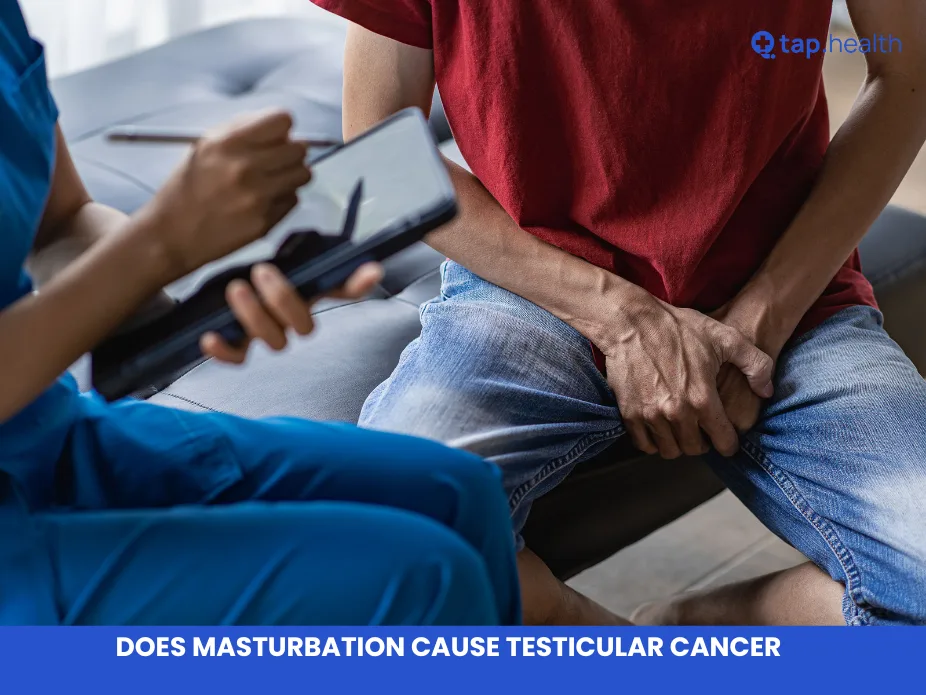Masturbation is one of the most common and natural sexual activities across all age groups. Yet, a persistent myth keeps circulating online — especially in India — that frequent masturbation can lead to testicular cancer. This blog clears the confusion with the latest medical evidence, expert opinions, and practical health advice.
What Exactly is Testicular Cancer?
Testicular cancer develops in the testicles (testes), the organs that produce sperm and testosterone. Though rare (about 1 in 250 men lifetime risk), it is the most common cancer in men aged 15–35 in India and globally.
Proven Risk Factors for Testicular Cancer
Medical science has identified clear risk factors. Masturbation is NOT one of them:
- Undescended testicle (cryptorchidism) – strongest risk factor
- Family history of testicular cancer
- Previous testicular cancer in one testicle
- HIV infection
- Certain genetic conditions (Klinefelter syndrome)
- Age group 15–35 years
Is There Any Link Between Masturbation and Testicular Cancer?
No. Zero scientific evidence supports this claim even in 2025.
Large-scale studies, including research published in British Journal of Urology International and reviews by American Cancer Society, confirm:
- No direct or indirect link exists between masturbation frequency and testicular cancer risk
- Ejaculation (through masturbation or intercourse) does not damage testicular tissue
- Regular ejaculation may even support prostate health (separate issue) and does not harm testicular cells
What Top Indian Experts Say
Dr. Ramesh Gupta, Senior Urologist, AIIMS New Delhi: “There is absolutely no evidence linking masturbation to testicular cancer. The disease is driven by congenital, genetic, and developmental factors — never by normal sexual activity.”
Dr. Anjali Mehta, Oncologist, Tata Memorial Hospital, Mumbai: “Masturbation is physiologically normal and healthy. Patients often come anxious because of internet myths. We reassure them that their habits are not causing cancer.”
Common Myths vs Reality
Myth: Frequent masturbation weakens testicles and causes cancer Reality: Testicles continuously produce sperm; ejaculation is a natural release mechanism
Myth: Holding semen increases testosterone and prevents cancer Reality: No proven benefit; forcing abstinence can cause discomfort but not cancer protection
Myth: Pain after masturbation means early cancer Reality: Mild discomfort can occur from over-stimulation; actual cancer usually presents as painless lump
Real-Life Indian Cases That Show the Impact of Myths
Case 1 – Arjun, 21, Mumbai Read a WhatsApp forward claiming “daily masturbation = 80% testicular cancer risk.” Stopped completely, developed performance anxiety. After consulting urologist, resumed normal life confidently.
Case 2 – Vikram, 26, Bangalore Found a lump, immediately thought “punishment for masturbation.” Turned out to be Stage 1 seminoma — completely unrelated. Early detection led to 98% cure rate.
How to Actually Reduce Your Testicular Cancer Risk
- Perform Monthly Testicular Self-Exam Best time: after warm shower when scrotum is relaxed Steps:
- Roll each testicle gently between thumb and fingers
- Feel for hard, painless lumps or swelling
- Normal to have one testicle slightly larger
- Adopt Healthy Lifestyle Habits
- Eat antioxidant-rich Indian foods (amla, spinach, tomatoes, nuts)
- Exercise 150 minutes/week
- Avoid all tobacco forms
- Maintain healthy BMI
- Know Your Family History If brother or father had testicular cancer, inform doctor — screening may start earlier.
- Never Ignore Symptoms See urologist immediately if you notice:
- Painless lump or swelling
- Heaviness in scrotum
- Dull ache in lower abdomen
Benefits of Masturbation Science Actually Supports
- Reduces stress and anxiety
- Improves sleep quality
- May lower prostate cancer risk (separate studies)
- Helps understand your body better
Can Too Much Masturbation Harm Testicular Health?
Excessive masturbation might cause temporary soreness or chafing, but it does NOT:
- Cause infertility
- Shrink testicles
- Trigger cancer
- Lower testosterone permanently
Is Masturbation Linked to Diabetes or Other Diseases According to TapHealth?
No. TapHealth and all major medical bodies (ICMR, WHO, Indian Association of Urologists) confirm masturbation has no connection with diabetes, heart disease, or cancer when practiced in moderation.
Bottom Line Masturbation does NOT cause testicular cancer — full stop. Focus on real risk factors, perform regular self-exams, live healthy, and ignore fear-mongering posts. Your body is designed for this natural activity. Stay informed, stay confident!
These organizations provide comprehensive information on testicular cancer, its causes, and prevention strategies.
FAQ on Does Masturbation Cause Testicular Cancer?
Does masturbation cause testicular cancer?
No, masturbation does not cause testicular cancer. There is no scientific evidence linking the two.
What are the risk factors for testicular cancer?
Risk factors include undescended testicle, family history, age (most common in young men), HIV infection, and personal history of testicular cancer.
How can I reduce my risk of testicular cancer?
Maintain a healthy lifestyle, perform regular self-exams, know your family history, and seek medical advice if you notice any unusual symptoms.
What are the symptoms of testicular cancer?
Common symptoms include a lump or swelling in the testicle, pain or discomfort in the testicle or scrotum, a feeling of heaviness in the scrotum, and sometimes, back pain.
How is testicular cancer diagnosed?
Diagnosis typically involves a physical exam, ultrasound, blood tests for tumor markers, and sometimes a biopsy or surgery.
Is testicular cancer treatable?
Yes, testicular cancer is highly treatable, especially when detected early. Treatment options include surgery, radiation therapy, and chemotherapy.
Can lifestyle choices affect testicular cancer risk?
While certain factors like genetics play a significant role, maintaining a healthy lifestyle can support overall health and may help reduce the risk of various cancers.
Should I stop masturbating if I’m worried about cancer?
No, you do not need to stop masturbating to reduce cancer risk. Masturbation is a normal and healthy activity with no proven link to cancer.
When should I see a doctor about testicular cancer?
If you notice any lumps, swelling, pain, or unusual changes in your testicles, consult a healthcare professional immediately.
Can testicular cancer recur after treatment?
Yes, testicular cancer can recur, but with regular follow-ups and monitoring, recurrences can often be treated successfully.



